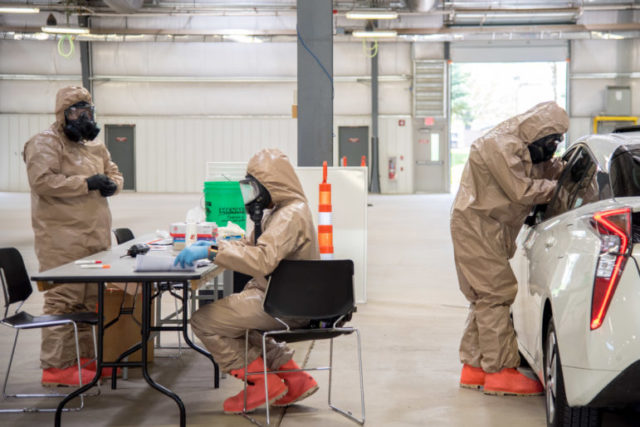TODD RICHMOND Associated Press
MADISON, Wis. (AP) — Three business groups filed a lawsuit Thursday seeking to block Gov. Tony Evers’ administration from releasing the names of more than 1,000 businesses with employees who have tested positive for COVID-19, saying the release would blacklist those operations as the disease surges across the state.
Wisconsin Manufacturers and Commerce along with the Muskego and New Berlin chambers of commerce filed the lawsuit in Waukesha County, a Republican stronghold. They allege that Evers is preparing to release on Friday a list of more than 1,000 businesses that have had two or more employees test positive in response to media requests.
Waukesha County Circuit Judge Lloyd Carter issued an injunction blocking any release for five days pending a hearing.
WMC argues that the data is extrapolated from employee medical records that are private under state law. Releasing the information would violate the employees’ privacy and ruin the businesses’ reputations, the groups contend.
Evers, a Democrat, told reporters during a teleconference Thursday afternoon that he hadn’t seen the lawsuit and couldn’t comment on it. However, he said the administration is trying to satisfy requests for information under Wisconsin’s open records law.
“We’re not going to be putting these lists of businesses on our website,” Evers aid. “We’ve been asked by media for lists of businesses under investigation. Our lawyers have worked on that and if it’s a legitimate release that we’ll be doing. We have an obligation to the public to obey the law in that area.”
The dust-up comes as COVID-19 is rampant across the state, leading to a record number of deaths and patients jamming hospitals.
State health officials reported 27 deaths on Wednesday, a new daily record. On Thursday, they reported 2,887 newly confirmed cases, another record. The state has now seen 125,161 cases and 1,348 deaths since the pandemic began. It ranks third in the nation for per-capita increases in cases over the last two weeks.
Nearly 700 people are currently hospitalized with the disease. According to state health officials, only 17% of hospital beds were available as of Thursday afternoon.
Kelly McBride Moore, a spokeswoman for Green Bay-based Bellin Health, said over the last week their emergency department has seen so many patients that at times nurses had to place them in beds on hallways.
Matt Heywood, president and CEO of Wausau-based Aspirus Health Care, said his system was averaging about 10 COVID-19 patients a day until about three weeks ago, when the average jumped to 47. As of Thursday, 61 of the system’s 345 total patients had the disease, he said, making it more difficult to move patients between facilities because beds aren’t available.
Dr. Imran Andrabi, president and CEO of Appleton-based ThedaCare, said the number of COVID-19 patients in his hospital has grown from 13 a month ago to 64 on Thursday. He added that 250 employees didn’t show up for work Thursday because they may have been exposed to the disease in the community.
Evers issued an executive order Thursday allowing health care workers licenses in other states to work in Wisconsin and out-of-state physicians to practice telemedicine here.
State Health Services Secretary Andrea Palm said her agency is working with hospital systems on whether the state needs to open a field hospital at the state fairgrounds in West Allis to handle overflow capacity. She didn’t elaborate. Dr. Mark Kaufman, chief medical officer for the Wisconsin Hospital Association, said the facility could open in four to seven days if needed.
Dr. Jeff Pothof, chief quality officer and an emergency medicine physician at University of Wisconsin Health in Madison, said the surge is being driven by people refusing to wear masks, college students returning to campus, people packing bars and attending gatherings.
“We don’t have a lot of boundaries in place,” Pothof said. “There’s COVID fatigue. People are tired of this. They’ve thrown in the towel and saying ‘I’m getting back to normal.’ And (then) there’s nothing to slow this down. We’re in a lot of trouble right now.”




























